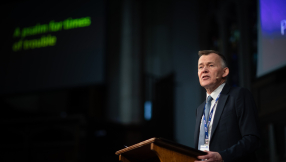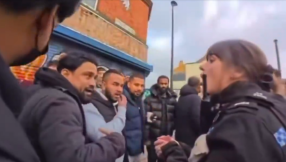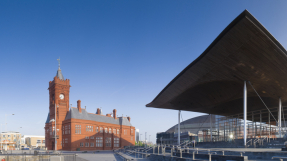A Byzantine church in North London
Father Anastasios Salapatas has been priest of the St Panteleimon Greek Orthodox church in Harrow for the last 16 years. Until now he and his congregation have been gathering for worship at a local Anglican church, but with the community growing and in need of a larger meeting place, the time seemed right to take the plunge and get to work on a brand new church building.
They could have followed the modern day trend for simple, stylish and functional church buildings, but the congregation were unanimous in their desire for a church in the Byzantine style.
“We needed a proper Byzantine orthodox church building mainly because, ministering to our own people here, it reminds them of the architecture and all the other customs of where they are from,” he said.
Receiving planning permission was no problem - the council were rather excited at the prospect of having something “like St Paul’s Cathedral” in their neighbourhood, he quips. One person told him the church would be a landmark in Harrow.
Even with all the scaffolding and grey concrete base walls, the distinctiveness of the church is permeable. True to the Byzantine style, its interior is in the shape of the cross, while a dome, barrelled roof, apses, and painted icons on the inner walls will complete the look.
Construction on the new church got underway last July and the aim is to have the building finished in time to hold a Christmas mass at the end of this year.
“The community here is expanding all the time and this was something that was definitely and desperately needed,” said Fr Salapatas, who is also principal of the local Greek school.
For St Panteleimon, one of about 26 Greek Orthodox parishes in London, the new building is as much about making a home away from home for the congregation, as it is about passing on their customs and traditions to a new generation.
“The local Greek community here demanded this. It is not that people came from Greece and Cyprus to build churches here. These people came here to live and to work and because they demand this then we are serving them,” he explained.
“They are living away from their homeland and when you do that then you try to secure the continuation of the traditions and customs. You want your children to grow up the same way as you had grown up and experience the best possible way all the experiences that you had in your homeland.
“They make a lot of effort to do that, travelling many miles to bring their children to the church here to learn their native language. It seems that the people want to preserve the faith and traditions.”
Reflecting this desire, the church built a community centre three years ago where it runs a nursery and school for Greek children.
“We have many functions, social and cultural, and it’s important for the people to preserve their culture. The religion and the faith is a part of what they are.
“As we say to our students in the school, the soul has two sides. One is ethnic which is Greek and the other is religious side which is in our case the Orthodox, and they’ve got to find the balance and preserve both sides.”
In his 24 years as a church minister, Fr Salapatas has seen people leave the church only to come back, sometimes many years later, because they need the sense of community and the spiritual power for living that the church gives them.
He hopes the splendour of the building will catch the curiosity of passersby and encourage them to come in.
“We pray in all our services for those who are not in the church building. We do not forget the part of our community that is not here with us when we have our services,” he said.
“Through their lifetime, people will come and go from church. It’s like that all the time in all Christian denominations,” he added.
While Fr Salapatas may not be worried about statistics and church attendance, he is greatly concerned about the divisions within the body of Christ.
“I find it quite stressful especially living in a multicultural and multi-religious society. It is very hard, this experience of not being together and coming together from time to time only for a social event.
“We cannot concelebrate the priest, we cannot have holy communion from the same holy chalice.
“That is very hard and stressful but we are working on that and we have to acknowledge that in the last few decades much work has been done towards unity.
“It’s not going to be realised very soon or very easily but now we talk.”
The dialogue, he says, is necessary because members of the Greek Orthodox Church are marrying Christians from other denominations and confusion is arising.
He added: “We cannot stay divided and be happy about it. We are not and we are trying hard to make this dialogue and the aim is unification.”
On the web: panteleimongr.blogspot.com/













